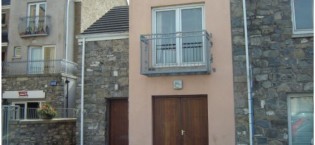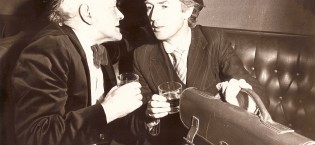Class Act
 Maria Mc Dermottroe made her stage debut at the age of six in an unique production in an indoor arena at The Holy Well. She played a little girl who had been miraculously cured in “Sight Unseen”, the story of the Lourdes apparitions. Since then she has become a sight to behold, blossoming from an enthusiastic, determined young actress in the local amateur ranks into one of the country’s finest professional actresses. She could scarcely have escaped the acting bug. Her father, Eddie, was a founder member of the Sligo Drama Circle and one of its leading players for many years, and her brother, Conor, has also become a professional actor.
Maria Mc Dermottroe made her stage debut at the age of six in an unique production in an indoor arena at The Holy Well. She played a little girl who had been miraculously cured in “Sight Unseen”, the story of the Lourdes apparitions. Since then she has become a sight to behold, blossoming from an enthusiastic, determined young actress in the local amateur ranks into one of the country’s finest professional actresses. She could scarcely have escaped the acting bug. Her father, Eddie, was a founder member of the Sligo Drama Circle and one of its leading players for many years, and her brother, Conor, has also become a professional actor.
She has vivid memories of early encouragement from her father. “I remember doing “Sight Unseen”, directed by Gerry Westby. I was only six years old, but I can vividly recall my father constantly encouraging me, and trying to teach me how to play to an audience. I thoroughly enjoyed it, and although I couldn’t have known it then, that’s probably where the bug started”, she said. The “bug” has carried her a long way – from the courageous decision to abandon a secure teaching career to wide acclaim as the central character in Brian Friel’s award-winning “Dancing at Lughnasa”. Lughnasa was a landmark in a career that is at last benefitting from years of solid hard work and dedication. It was a prestige part to land, a confidence builder in its own right, but it was also a massive challenge. The original cast had swept the boards on Broadway; it was always going to be a hard act to follow. But 241 performances later – including a five month, eight performance a week stint in Australia – Maria is satisfied that the challenge has been met.
“It was a daunting task to live up to the success of the original cast, and I suppose initially, we were all a bit conscious of that. But I have to say I think we did a pretty good job, and the reaction from audiences and from critics bears that out”, she says. The hard work had its compensations, however, not the least of which was the opportunity to bring her children, Nora (12) and Gina (9) for a five month holiday in Australia. “It was a wonderful experience in itself. The kids went to school and got a once-in-a-lifetime chance to experience a lifestyle that would otherwise be totally foreign to them. That was a real bonus. I also discovered how well my brother, Conor, was doing out there. He’s done a lot of movie work in Australia, and I became known as ‘Conor Mc Dermottroe’s sister’, which was a bit of a change of roles, but nice all the same”.
It was all a far cry from her early years on the stage, a period of her life which she recalls fondly. “I did loads of plays with the Drama Circle, with people like Walter Mc Donagh and Liam Mc Kinney, who were major influences. We toured the festival circuit and picked up awards here and there, and all the time I was itching to give it a real go”, she recalls. She spent three years teaching in Summerhill College before that “itch” became unbearable. Poignantly, it was a tragic event which finally triggered her decision. “A close friend of mine died tragically at the age of 25 years, and that brought home to me that you only get one shot at this life. It’s not a dress rehearsal, it’s the real thing. So I plucked up the courage, took the bull by the horns, and said ‘here goes'”, she explains.
Her first step into the world of professionals was as a temporary Assistant Stage Manager at the Gate Theatre during the summer holidays. She returned to Summerhill at the start of the new school term in September, but shortly afterwards cam the break she had been hoping for when she was offered the A.S.M. job on a full-time basis. She didn’t have to asked twice. But it was far from glamorous, and Maria quickly realised that she had a lot to learn. The job entailed sweeping the stage, walking the streets looking for suitable props for whatever production happened to be in need of same, and carrying out whatever other basic requirements were necessary. It was a massive change from teaching, and it was totally without security, but this was where she wanted to be. “It was like starting all over again, learning from scratch, and really, this profession is a constant learning process. I’m still learning. That’s the way it should be. You never know enough”, she maintains.
Although content that her job at the Gate was at least a start, Maria’s unqualified ambition was to be an actress, and her big break came when she was cast by the renowned and revered Hilton Edwards, in his production of “The Merchant of Venice”. “I could hardly believe this was happening. I was only a couple of months at the Gate and here I was with a good professional part and being directed by Hilton Edwards. It was literally a dream come true”, Maria recalls. If that was fame of sorts, notoriety was just around the corner. She was offered a part in “Equus” which gave her the distinction of playing the first full nude scene on an Irish stage. It was obviously a very difficult decision. “I agonised long and hard over it”, she confesses. “In the end, despite some insidious objections, I knew I had made the right decision. It was sensitively handled, and very tastefully done. I have no regrets about doing the show, and it turned out to be a great success”.
Since then, Maria has rarely been out of work. Television and film work – including John Huston’s “The Dead” – followed, as well as acclaimed stage work with Druid and the Abbey. But Maria knows there is never any guarantees about the future. “You’re only as good as your last part”, she declares. “There are no certainties in this game. But I’ve been very fortunate so far and, hopefully, that will continue”. At present, Maria is playing to packed houses in J. B. Keane’s “The Chastitute” at Dublin’s Gaiety Theatre. “It’s a light, funny play, ideal for summer audiences. It’s completely different from my role in Lughnasa, but all the better for that. It’s a barrel of laughs, and has been going down very well so far, thank God”, she says.
There are a few options in the pipeline after “The Chastitute” but nothing definite. “That’s part of the job, never knowing where the next one is coming from. It can be a problem, but I’m not complaining. You can take it that I have no plans to go back to the teaching”, Maria laughs. As a product of the amateur drama movement in Sligo, Maria Mc Dermottroe is a credit to her tutors and to her native town.
An interview with Maria Mc Dermottroe by Jim Gray in The Sligo Champion, Showstopper Series, July 9th, 1993
Tags: History, Reflections








